Character,characteristic,trait,personality,attribute,feature,property
”Character”(性格)和”characteristic”有什么区别?
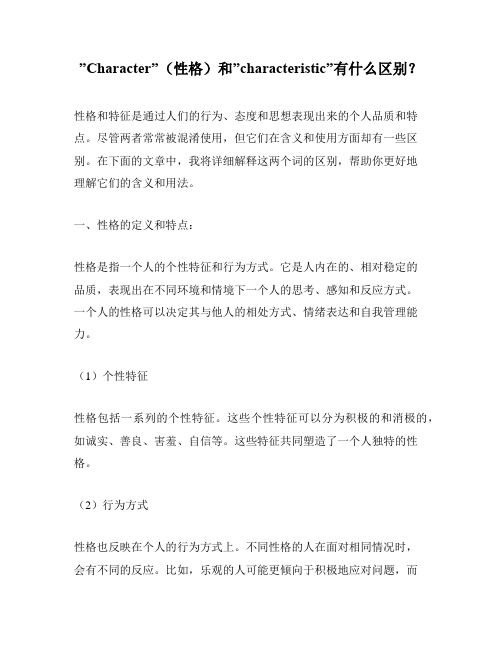
”Character”(性格)和”characteristic”有什么区别?性格和特征是通过人们的行为、态度和思想表现出来的个人品质和特点。
尽管两者常常被混淆使用,但它们在含义和使用方面却有一些区别。
在下面的文章中,我将详细解释这两个词的区别,帮助你更好地理解它们的含义和用法。
一、性格的定义和特点:性格是指一个人的个性特征和行为方式。
它是人内在的、相对稳定的品质,表现出在不同环境和情境下一个人的思考、感知和反应方式。
一个人的性格可以决定其与他人的相处方式、情绪表达和自我管理能力。
(1)个性特征性格包括一系列的个性特征。
这些个性特征可以分为积极的和消极的,如诚实、善良、害羞、自信等。
这些特征共同塑造了一个人独特的性格。
(2)行为方式性格也反映在个人的行为方式上。
不同性格的人在面对相同情况时,会有不同的反应。
比如,乐观的人可能更倾向于积极地应对问题,而悲观的人可能更容易陷入困境。
二、特征的定义和特点:特征是表示个体或事物独特特性的词语。
它描述了事物的特点、属性或身份。
特征可以用来描述人的外观、性格和能力等方面。
(1)外部特征特征可以涉及外部方面,如外貌、身高、体型等。
这些特征在一个人的形象和身份认同中起着至关重要的作用。
(2)内在特征特征也可以描述人的内在特点,如性格、能力和习惯等。
这些特征是人们在日常生活中展示自己的重要方面。
三、性格和特征的联系和区别:性格和特征在一定程度上是相互联系的,但它们也有一些明显的区别。
(1)关注点不同性格更关注个人内在的品质和行为方式,而特征更关注个体外部的特点和身份。
(2)影响范围不同性格是一个人相对稳定和持久的品质,影响着其思考、感知和行为方式。
特征则更加具体,描述了一个人或事物的某一方面。
(3)表达方式不同性格通常是通过行为、态度和思想来表达的,而特征则可以通过外貌、能力和习惯等方面来表达。
综上所述,性格和特征在含义和用法上有所区别。
性格更关注个体内在的品质和行为方式,而特征则更注重个体的外部特点和身份。
高中英语必修五词汇 辨析

【解释】
cure表示治愈的结果
treat表示治疗的过程
【练习】选择cure或treat并用其适当的形式填空
1) After being ________ for such a long time, the wound ___________ at last.
4) blame/scold责备
必修五词语辨析及词形变化
Unit 1 Great Scientists
词语辨析
1). character/characteristic n.
【解释】
character性格,品质(本身具有的);角色,人物;字体,字符
characteristic特点,特征(区别于其他事物)
【练习】选择character或characteristic并用其适当的形式填空
suggestion n.提议,意见,暗示,
【练习】用括号内所提供词的适当形式填空
1) These meals are quick and _________ to prepare. We provide these meals for the _____ of the customers. (convenience)
enthusiast n.热心家,狂热者
valuable adj.有价值的
value n.价值
value v.估价,评价
【练习】根据句子结构,用括号内所提供词的适当形式填空
1) The _________ took a very ________ approach to _________.(science)
3)I _________ with her all day about the situation.
Personality,character, characteristic的区别

Personality,character,characteristic的异同(英语摘自collins,汉语是我自己的分析,仅供参考)Personality只能说人,强调品格,包含性格1.Y our personality is your w hole character and nature.包括character,性格,本性She has such a kind, friendly personality...2.If someone has personality or is a personality, they have a strong and lively character.有鲜明个性...a woman of great personality...He is such a personality–he is so funny.= character3.Y ou can refer to a famous person, especially in entertainment, broadcasting, or sport, as apersonality.名人Character可以说物和地点,强调特点,另外,有“角色,字符等意思”1.The character of a person or place consists of all the qualities they have that make themdistinct from other people or places.某人或某物拥有的特性,使其与其他不同Perhaps there is a negative side to his character that you haven't seen yet...2.If something has a particular character, it has a particular quality.特性The financial concessions granted to British Aerospace were, he said, of a precarious character...3.You can use character to refer to the qualities that people from a particular place are believedto have.描述某地区人的特点Individuality is a valued and inherent part of t he British character.4.Your character is your personality, especially how reliable and honest you are. Ifsomeone is of good character, they are reliable and honest. If they are of bad character, they are unreliable and dishonest.He's begun a series of personal attacks on my character...Mr Bartman was a man of good character.5.If you say that a place h as character, you mean that it has an interesting or unusual qualitywhich makes you notice it and like it.An ugly shopping centre stands across from one of the few buildings with character.6.角色He's made the characters believable.7.字,字符Characteristic1.The characteristics of a person or thing are the q ualities or features that belong to them andmake them recognizable.特点,特性...their physical characteristics.= feature, trait2. A quality or feature that is characteristicof someone or something is one which is often seenin them and seems typical of them.典型特征。
考研英语核心词汇详解personality
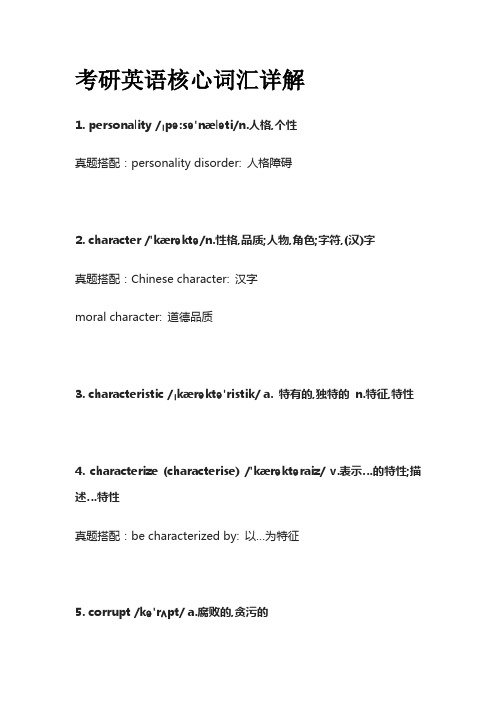
考研英语核心词汇详解1. personality /ˌpə:sə'næləti/n.人格,个性真题搭配:personality disorder: 人格障碍2. character /'kærəktə/n.性格,品质;人物,角色;字符,(汉)字真题搭配:Chinese character: 汉字moral character: 道德品质3. characteristic /ˌkærəktə'ristik/ a. 特有的,独特的n.特征,特性4. characterize (characterise) /'kærəktəraiz/ v.表示…的特性;描述…特性真题搭配:be characterized by: 以…为特征5. corrupt /kə'rʌpt/ a.腐败的,贪污的解析:cor(core内部)+rupt(break)—从内部断了引申:corruption: n 贪污,腐败6. abrupt /ə'brʌpt/ a.突然的,意外的;(行为等)粗鲁无礼的解析:ab(背离,离去)+rupt(break)--- 离开断掉7. colleague /'kɔli:g/ n.同事,同僚8. college /ˈkɑːlɪdʒ/ n 学院,大学9. university /ˌju:ni'və:səti/ n 大学10. universe /'ju:nivə:s/ n.宇宙,万物解析:uni(单一,统一)+verse(旋转)—万物转成一体引申:universal: adj 普遍的,全体的;n普遍情形1. judge /dʒʌdʒ/ v.审判;评论,裁判;n.法官2. justice /'dʒʌstis/ n.公正,公平;法官辨析:Justice: n(大)法官;judge: n(地方)法官3. judgement /'dʒʌdʒmənt/ n. 审判,判决;判断(力);看法,意见4. verdict /'və:dikt/ n.裁决,判决;判断;定论辨析:judgement为法官做出的判决,verdict 为陪审团做出的判决5. jury /'dʒuəri/ n.陪审团;全体评审员6. justify /'dʒʌstifai/v.证明...正当(或有理、正确),为...辩护引申:justification: n 公正;辩解,辩护7. skeptical /'skeptikəl/ a.怀疑的真题搭配:be skeptical of sth: 怀疑某事8. combine /kəm'bain/v.联合;结合;兼并解析:com(together)+bine(bind捆,绑)---全都捆到一起了真题搭配: combine A with(and)B;A, combined with B9. combination /ˌkɔmbi'neiʃən/ n.结合,联合;兼并真题搭配:in combination with: 和…一起10. obey /əu'bei/ v.服从, 顺从1. eligible /'elidʒəbl/ a.符合条件的; 有资格的解析:e(出来)+lig(选择)+ible(能够)---能够选出来的真题例句:It was not until the 1940s that a majority of states made women eligible for jury duty. (2010 Text 4 英语二)直到20世纪40年代,大多数州才让女性有资格担任陪审员。
新东方考研英语词汇记忆群

新东方考研英语词汇记忆群词汇记忆组群91:character n.①[U]性格,品质②[U]性能③[C]人物,角色④[C]字符,(汉)字characterize vt.表示……的特征,描述……的特征characteristic a.特有的,独特的;n.[C]特征peculiar a.①特殊的,特有的②奇异的,古怪的peculiarity n.①独特之处,特色②奇怪,古怪special a.①特殊的②专门的③附加的,额外的especially ad.特别,尤其specialist n.[C]专家specialty n.[C]①专业,专长②特性,特质specialize vt.(in)专门研究,专攻,专业化specific a.①特有的,特定的②具体的,明确的sepcification n.[C]①详述②(pl.)规格,说明书specify v.指定,详述species n.(物)种,种类spectacle n.①(pl.)眼镜(比glasses正式)②[C]壮观,奇观spectacular a.壮观的,引人入胜的;n.[C]壮观的演出spectator n.[C]观众,旁观者prospect n.前途,前景expect vt.①期望,预期②料想,认为expectation n.[C]期待,预期speculate vt.①思考②投机③推测aspect n.①样子,外表②方面inspect vt.①检查②视察respect vt.n.尊敬,尊重;n.(pl.)敬意,问候respectable a.①可敬的,高尚的②体面的,正派的respectful a.充满敬意的,有礼貌的respective a.各自的,各个的irrespective a.不考虑的conspicuous a.显眼的,明显的suspicion n.怀疑,猜疑suspicious a.①(主动意义)多疑的,疑心的②(被动意义)可疑的suspect vt.①怀疑②觉得,猜想;n.[C]可疑分子,嫌疑犯doubt v.n.怀疑,疑虑doubtful a.①怀疑的②可疑的dubious a.①(of, about)犹豫不决的,无把握的②(值得)怀疑的duplicate n.复制品,副本;a.①复制的②双倍的;vt.①复制②使翻倍double a.两倍的,成双的;v.(使)加倍,翻一番;n.两倍couple n.①夫妇②对,双;vt.连接,结合pair vt.成双,配对;n.①一对,一双,一副②夫妇,情侣词汇记忆组群92:abstract a.①抽象的②深奥的;n.摘要,提要;v.提(抽)取contract n.[C]合同,契约;v.①缩短,缩小②缔结distract vt.①分散(注意力等)②迷惑,弄昏extract vt.①取出,拔出②榨取,提取;n.摘录extraction n.抽出,拔出retract v.①缩回,缩进②收回,取消subtract vt.减去attractive a.有吸引力的,有魅力的attract vt.吸引,引诱fascinate vt.强烈吸引,使着迷charm v.①迷人,使陶醉②施以魔法;n.①魅力②美貌charming a.迷人的,可爱的magnetic a.①有吸引力的②磁的,有磁性的magnetism n.①磁,磁力②吸引力magnet n.①[C]磁铁,磁体②有吸引力的人或物magic n.[U]魔法,魔术;a.有魔力的,魔术的magician n.魔术师bewilder vt.(使)迷惑puzzle n.①谜②难题;v.使迷惑dazzle vt.①使迷惑,使倾倒②耀眼,眩目;n.①耀眼的光②令人赞叹的东西dizzy a.头晕目眩的词汇记忆组群93:ultimate a.①根本的②最后的radical a.①重要的,基本的②激进的,极端的radio n.①无线电通讯②收音机③电台;v.用无线电通信radioactive a.放射性的,放射引起的radioactivity n.放射性,放射现象radish n.小萝卜radium n.镭radius n.[C]半径radiate v.①传播,散布②发光,辐射spread v.n.①散布,传播②伸展,展开③蔓延,传染stretch v.拉长,伸;n.[C]①一段时间,一段路程②拉长,延长lengthen v.延长,(使)变长length n.①[U]长度②[C]一段,一节③程度,范围prolong vt.拉长,延长belong vi.①应归入②(to)属于(无被动语态)belongings n.(pl.)所有物,行李long vi.渴望;a.ad.长久的(地),长期的(地)longing n.(for)渴望longitude n.[U]经度latitude n.纬度attitude n.①姿势②态度,看法altitude n.高度,海拔aptitude n.①才能②适当ability n.①能力,智能②才能,才干disable vt.使无能,使伤残enable vt.使能够,使成为可能词汇记忆组群94:likely a.①(作表语)可能的②(作定语)有希望的;ad.大概,多半likelihood n.可能性likeness n.相似,相同likewise ad.①同样地②也,又,而且dislike vt.n.不喜爱,厌恶unlike a.不同的,不相似的;prep.不像……,和……不同unlikely a.①未必的②不可能发生的alike a.(只做表语,不作定语)相同的,相像的like v.①喜欢②希望,想要;prep.像;a.相似的;n.相似的人或物;conj.如同,好像love vt.爱,喜欢;n.热爱lovely a.①可爱的,好看的②令人愉快的beloved a.n.深爱的(人)favor n.①喜爱②赞成③帮助,恩惠;vt.①喜爱②支持③给……恩惠favorable a.①有利的②赞成的favorite a.特别受喜爱的fond a.①(只作表语,不作定语)喜欢的②(作定语)溺爱的hate v.①憎恨②不愿,不喜欢hateful a.可恨的hatred n.[U]憎恶,憎恨spite n.①恶意②怨恨despite prep.不管,不顾词汇记忆组群95:time n.①时间②时代③次,回epoch n.[C](新)纪元,(新)时代era n.时代age n.①时期,时代②年龄;vi.变老,老化phase n.时期;阶段,状态stage n.[C]①阶段,时期②舞台,戏剧drama n.①戏剧,剧本②戏剧性的场面或事件dramatic a.①引人注目的②戏剧的,剧本的music n.[U]音乐,乐曲musical a.①音乐的②悦耳的③有音乐才能的,喜欢音乐的;n.①音乐片②音乐喜剧tragic a.悲剧的tragedy n.[C]①悲剧②悲惨的事comedy n.喜剧overcome vt.战胜,克服become vi.成为;vt.同……相称,适宜income n.收入,所得词汇记忆组群96:identify vt.①认出(身份,物件等),鉴定②(with)把……和……看成一样,打成一片③同感,发生共鸣identification n.[U]①认出,识别②身份证明identical a.(to, with)相同的,相等的equal a.①相等的②(to)胜任的;n.[C](地位)相等的人或事物;vt.①等于,相等②比得上equality n.[U]平等,同等equivalent a.相等的,相当的;n.相等物,等价物equation n.[C]①方程式,等式②(with)相等,均衡equator n.赤道inadequate a.①不充足的②不够格的adequate a.①足够的②可以胜任的sufficient a.①(for)足够的,充分的②有充分能力的insufficient a.不足的deficiency n.①不足②缺陷efficiency n.[U]效率,功效efficient a.①效率高的②(人)有能力的,能胜任的coefficient n.系数proficiency n.熟练,精通profile n.①侧面(像)②轮廓,外形③人物简介file n.①档案②(计算机的)文件;vt.把……归档;vi.排成队行进document n.文献documentary a.文献的;n.纪录片doctrine n.①教条,主义②学说doctor n.①医生②博士bachelor n.[C]学士master n.①(M-)硕士②男主人,雇主③师傅,名家;vt.精通,掌握;a.主要的masterpiece n.[C]杰作,名著词汇记忆组群97:fiber n.①纤维,纤维质②质地,结构fabric n.①织物②构造,结构fabricate v.①制造,装配②捏造,伪造manufacture vt.制造,加工;n.①制造,制造业②产品factor n.①因素②因子,系数facility n.①容易,简易②便利③设备,工具faculty n.①本领,才能②全体教员③(大学的)系,学院gift n.①天赋,才能②礼物,赠品gifted a.有天赋的talent n.①天赋,才能②人才talented a.有才干的,有天资的skill n.①[C]技能,手艺②[U]熟练spill v.溢出,溅出;n.[C]摔下,跌下pillar n.①柱,栋梁②重要的支持者elite n.精英,名流词汇记忆组群98:suit vt.①合适,适合②相配,适应;n.[C]①一套西服②诉讼unsuitable a.(for)不合适的suitable a.适合的appropriate a.适当的,恰当的improper a.①不合适的②不正确的proper a.①适合的,适当的②正当的③(to)特有的④本身的(放在被修饰词之后)apt a.①恰当的,合适的②易于……的,倾向于opt v.选择optional a.选择性的,非强制的adopt vt.①收养②采用,采纳adapt vt.①使适应②改编adjust vt.①调整,调节②校正reconcile vt.①使和好,调解②(to, with)使一致screw vt.①旋紧②用螺丝定住;n.螺丝orient vt.调整,定……的方位;n.(the Orient)东方,亚洲oriental a.东方的orientation n.①方向,方位②熟悉,适应originate v.①起源,发生②首创,创始original a.①最初的②原文的③有创造性的;n.原作,原版文章origin n.①起源②出身,来历(可用pl.)birth n.①起源②出生③血统,出身born a.天生的,生来的stem vi.起源于;n.[C]①基,干②词干root n.[C]①根本,根源②根(部);v.(使)扎根,(使)生根derive vi.起源于;vt.取得deprive vt.①剥夺,使丧失②免去……的职务privilege vt.给予优惠,特免;n.优惠,特权privacy n.①隐居②隐私,私事词汇记忆组群99:write v.写,写作right a.①正确的②合适的③右边的④直(角)的⑤正常的,健康的;ad.①正确地②径直地,直接地③正好,完全;n.①[C]权力,法权②[U]右面blunder v.①(因无知,粗心等)犯大错②跌跌撞撞地走wrong ad.错误地;a.有毛病的,错误的error n.错误,谬误erroneous a.错误的,不正确的mistake n.[C]错误,过失,误解;v.误解,弄错fault n.①过错②毛病③故障faulty a.①有错误的②有缺点的fail vi.①失败,不及格②不能③衰退④短缺;vt.①使失望②使不及格failure n.①失败(的人或事)②失灵drawback n.[C]缺点,欠缺flaw n.①缺点,瑕疵②裂痕disadvantage n.①不利,缺点②损害,损坏advantage n.①优点,优势②好处virtue n.①优点②美德merit n.优点,价值,功绩;v.值得,应得morality n.[U]道德,美德moral a.道德(上)的,道义的;n.寓义词汇记忆组群100:void a.①没有的,缺乏的②空虚的avoid v.避免,回避,躲开(+doing/n.)inevitable a.不可避免的vain a.①自负的②空虚的③徒劳的;n.徒劳,白费vanity n.①自负②虚荣心,虚浮vanish vi.突然不见,消失vacant a.①空虚的②空的,未被占用的empty a.①空的②空虚的,空洞的;vt.倒空hollow a.①空的,空洞的②空洞的,空虚的;vt.掏空,挖空shallow n.(pl.)浅滩;a.①肤浅的②浅的swallow n.燕子;v.吞下allow vt.①让……得到②承认③允许,准许allowance n.津贴,补助费词汇记忆组群101:sequence n.①顺序②连续consequence n.[C]①结果,后果,影响②重要性consequently ad.所以,因此subsequent a.随后的,后来的persecute vt.迫害execute vt.①(for)将……处死②实施,实行executive a.执行的,实施的;n.[C]总经理,董事sue vt.控告,对……提出诉讼;vi.(for)起诉tissue n.①(机体中的)组织②织物③薄纸issue n.①[C]问题,争端②发行(物),(报刊)期号;vt.①发行,发表②流出,发出pursue vt.①追赶②追求,从事pursuit n.①追赶,追逐②工作,消遣词汇记忆组群102:organ vt.①器官②风琴③机构,报刊organic a.器官的,有机的organism n.有机体,生物体organize vt.组织establish vt.①建立,设立②确立,使确认establishment n.①[U]建立,设立,确立②[C]建立的机构(或组织)stable a.稳定的,安定的;n.[C]马厩,马棚stab v.n.刺,戳stabilize v.安定instability n.不稳定(性)stability n.[U]稳定,安定static(al) a.静力的②静态的station n.①[C]车站,局,所,站②身份,地位;vt.安置,驻扎stationary a.固定的,静止的stationery n.[U]纸张文具(总称)state n.①(sing.)状态,情况②国③洲;vt.陈述,说明statesman n.(褒)政治家stubborn a.①(人)顽固的,倔强的②难对付的,难以克服的obstinate a.固执的,顽固的estate n.房地产,财产,状态,时期,阶层steady a.①稳定的,坚定的,扎实的②不断的,经常的;v.(使)稳固,(使)稳定system n.[C]①系统,体系②制度,体制systematic(al) a.①系统的②有组织的destiny n.命运destination n.目的地,终点,目标status n.[U]①地位,身份②情况,状况statue n.[C]塑像,雕像stature n.身材satire n.讽刺obstacle n.[C]障碍stall n.[C]①货摊②畜栏,厩;v.①(使)停转,(使)停止②拖延(时间)installation n.①[U]安装②[C]装置,设备install vt.安装,安置fasten v.拴紧,扣紧,系,使固定于fix v.①固定②安装,修理③确定,安排fixture n.固定(物)词汇记忆组群103:bar vt.闩上,阻挡;n.[C]①(喻)障碍②条,棍,栅栏③酒吧④(The Bar)法庭barrier n.[C]①障碍(物)②栅栏embarrass vt.使窘迫,使为难awkward a.①尴尬的②不好使的③笨拙的,不灵巧的clumsy a.笨拙的,愚笨的shrewd a.机灵的,敏锐的,精明的bright a.①聪明的,伶俐的②明亮的,光亮的③快乐的brilliant a.①卓越的,有才华的②光辉的,灿烂的a.①聪明的,巧妙的,伶俐的②漂亮的,潇洒的;v.烦恼,刺痛clever a.①聪明的②伶俐的,机敏的lever n.[C]杆,杠杆;v.抬起elevate vt.①使(思想,品质)高尚,提高(文化素质)②提高,举起,提升……职位elevation n.[C]高度elevator n.电梯,升降机alleviate vt.减轻,缓解,缓和relevant a.①有重大意义的②适当的,中肯的③有关的④实质性的relief n.减轻,免除,救济relieve v.①减轻(痛苦等)②援救,救济③使……免受词汇记忆组群104:route n.①[C]路线,路程②航程routine a.例行的,常规的;n.例行公事,常规periodical n.期刊,杂志;a.周期的,定期的yearly a.每年的monthly a.每月的;ad.按月,每月一次;n.[C]月刊daily a.ad.每日的(地);n.日报journal n.[C]①日报,杂志②日记journalist n.[C]记者,新闻工作者reporter n.①[C]记者,通讯员②报告人,广播员report n.①[C]报告,汇报②传说,传阅;vi.①报告,汇报②(to)报到export n.出口(商品),输出;vt.输出,出口import n.①(pl.)进口商品②要旨;vt.进口,输入transport v.传送,运输;n.[U]运输support vt.支持back v.①支持②使后退;a.后面的;ad.①以前②向后,回复,后退;n.[C]后面,背backward a.①迟钝的②向后的,倒行的,落后的;ad.向后inward a.里面的,向内的;ad.(inwards)向内,在内outward a.外表的;ad.朝外地onward a.面前的;ad.向前upward a.向上的,上升的;ad.(upwards)向上,……以上award n.奖(品);v.授予,奖给reward n.vt.①酬劳,奖赏②报答punish v.惩罚,处罚punishment n.惩罚,处罚penalty n.惩罚,处罚repent v.后悔,悔悟regret v.n.[U]懊悔,遗憾词汇记忆组群105:ready a.①准备好的,现成的②甘心的③快要……的readily ad.①乐意的,欣然地②容易地real a.①真的,真实的②实际的,现实的realistic a.①现实的②现实主义的reality n.①现实②真实realization n.实现realize vt.①实现②认识到achieve vt.①完成,实现②达到fulfill vt.履行,完成accomplish vt.完成accomplished a.熟练的,有技艺的ample a.①足够的②宽敞的③充分的,富裕的amplify vt.放大,增强complete vt.完成,使圆满;a.①完整的②完成的completion n.完成,完满complementarity n.互补性complement vt.补充,补足;n.补充(物)implement n.[C](pl.)工具;vt.实现,贯彻compliment vt.①称赞,赞美②向……致意;n.①(pl.)问候,致意②[C]赞美perplex vt.①使困惑,使费解②使复杂化complicate v.(使)复杂化complication n.复杂,纠纷complexity n.复杂性,复杂的事物complex a.复杂的,合成的sophisticated a.①尖端的,复杂的②老练的,世故的philosophy n.①哲学②见解,观点philosopher n.哲学家,哲人sophomore n.[C](大学)二年级学生fresh a.①新来的,新的②新鲜的③(水)淡的veteran n.①老年,有经验的人②老兵;a.①老练的②老式的,陈旧的词汇记忆组群106:mood n.[C]①心情,情绪②(语法)语气good a.好的,适合的,有益的;n.好处,利益well n.井,水井;ad.好地,完全地,大大地better vi.改善;n.(加the)较优者;a.ad.较好best a.ad.最好的bad a.①严重的②腐败的③坏的,恶性的④不舒服的⑤顽皮的ill a.①坏的,恶意的,不吉祥的②有病的(做表语);ad.坏地,恶意地,不利地wicked a.①邪恶的②顽皮的ruthless a.残酷的,无情的evil a.邪恶的;n.罪恶devil n.魔鬼,恶魔vice n.①坏事,罪恶;a.副的,次的②缺点,毛病③老虎钳vicious a.①邪恶的②凶暴的mercy n.[U]仁慈,宽恕,怜悯pity vt.怜悯,爱惜;n.①怜悯,同情②遗憾,可惜词汇记忆组群107:colonel n.(陆军)上校colony n.殖民地colonist n.殖民地居民cultivate vi.①教养,培养②耕作foster vt.①养育,抚育②培养,鼓励;n.①养育者②鼓励者breed vt.①繁殖,生殖②产生,引起③教养,抚养;n.种类nourish vt.提供养分,养育cherish vt.①抚育②珍爱③怀有treasure n.财宝,宝物,宝贝;vt.珍视prize v.珍视,珍惜;n.奖赏,奖品,奖金price v.标价;n.①价格②代价priceless a.无价的,珍贵的less n.较少;a.少的;ad.较少地bless vt.①祝福,保佑②(with)使有幸得到blessing n.[C]祈福,祝福词汇记忆组群108:deafen vt.使变聋deaf a.①聋的②不愿听的leaf n.[C]①叶子②(书刊的)张页③金属薄片leaflet n.[C]①传单,活页②小叶pamphlet n.小册子list n.①[C]表,传单;vt.把……编列成表mist n.[C]薄雾fist n.拳头stomach n.[C]胃,胃口thigh n.大腿,股thumb n.拇指chest n.①胸,胸部②箱,柜③金库,钱库chin n.下巴bosom n.(心)胸elbow n.[C]肘,肘状物;v.用肘挤shoulder n.[C]肩部;vt.肩负,承担kidney n.[C]肾nose n.[C]①鼻子②突出部分,(飞机,船等的)前端skin vt.剥皮;n.①皮(肤)②真皮,皮毛palm n.①手掌②棕榈itself pron.它自己,它本身person n.人,本人,自身personality n.人格,个性personal a.①个人的,私人的②人体的,身体的③亲自的,本人的personnel n.①全体人员②人事(部门)词汇记忆组群109:land n.①[C]国土,国家②[U]土地③[U]陆地;v.(使)着陆landing n.①登陆,着陆②楼梯平台inland a.内陆的,国内的;ad.在内地highland n.高地,高原plateau n.高原pasture n.牧场pastime n.娱乐,消遣recreation n.娱乐,消遣create vt.①引起,造成②创造,创作③创立creative a.创造性的,有创造力的creature n.[C]①生物,动物②人feature n.①特征②(pl.)面貌,长相③(电影的)正片,故事片feasible a.可行的,可能的defeat vt.击败,战胜;n.失败feast vt.盛宴款待;n.①宴会②赏心悦目的事物festival n.节目repeat v.①重复②复述;n.[C]重复repetition n.重复,反复词汇记忆组群110:tell v.①分辨②泄露③告诉,吩咐distinguish vt.①区别,辨别②使杰出③辨认出,看清楚distinct a.①(from)截然不同的②清楚的,明显的distinction n.[C]①差别②区分sting v.①叮,螫②刺痛,刺;n.[C]刺(痛)instinct n.①本能②天性extinct a.①熄灭了的②灭绝的extinguish vt.熄灭,扑灭(火等);vi.消灭quench vt.①熄灭,扑灭②解(渴)trench n.[C]壕沟,战壕wrench vt.①歪曲②猛拧,扭伤;n.①拧,扭动②扳手twist n.①拧②曲折③曲解;v.①搓,捻②扭(弯)③歪曲,曲解distort vt.①扭曲②歪曲,曲解torture n.vt.折磨,拷打rack v.使痛苦,折磨;n.[C]搁物架,挂物架sack vt.解雇;n.[C]袋lack v.缺乏,不足slack a.①松(弛)的,不紧的②萧条的③懈怠的,懒散的;n.①淡季,萧条②(pl.)便裤,运动裤crack n.[C]①裂缝②破裂声;v.①(使)破裂,(使)发出爆裂声②解开(难题)crank a.脾气暴躁的,易怒的;n.曲柄craft n.[C]①工艺,技巧②(单复数相同)飞船,飞机crazy a.①疯的②荒唐的③狂热的,热衷的mad a.①发疯的②生气的③狂热的词汇记忆组群111:act vi.①行动,做事②起作用;vt.①扮演;n.①行为,动作②[U](一)幕③法令,条例action n.①行动,动作②[U]作用interact vi.互相作用,互相影响activate v.使活跃,激活exactly ad.正确地,严密地,确切地react vi.①反应,起作用②(against)反对,起反作用transaction n.①交易②处理,办理active a.活跃的,主动的passive a.被动的,消极的pathetic a.可怜的,悲惨的compatible a.①和睦相处的,合得来的②兼容的patient a.有耐心的,能忍耐的;n.病人,患者impatient a.不耐烦的patience n.忍耐,耐心sympathetic a.同情的,共鸣的sympathize vi.①(with)同情,怜悯②共鸣,同感sympathy n.[C]①同情(心)②赞同passion n.①热情②强烈情感(尤指爱,恨,怒)enthusiasm n.热情,热心enthusiastic a.热情的,热心的zealous a.热心的,热情的zeal n.热心,热情seal vt.封;n.[C]①海豹②印,图章③封口steal v.①偷,窃取②溜走(进)theft n.偷窃pirate vt.①盗印(书籍)②盗制(唱片,录音带等);n.①海盗②盗印者③侵犯专利权者hijack n.vt.抢劫,劫持smuggle vt.①走私②偷运rob v.(of)①抢劫,盗取②非法剥夺rod n.[C]杆,棒nod n.v.①点(头)②点头招呼③打盹词汇记忆组群112:govern vt.①统治,治理②支配,决定government n.[C]①政府②管理,治理③政治governor n.[C]①统治者②总督,州(省)长politics n.①政治(学)②政纲,政见politician n.政治家,政客(贬义)hierarchy a.①等级制度②统治集团,领导阶层bureaucracy n.①官僚机构②官僚作风③官僚bureau n.[C]署,局,司,处republic n.共和国republican a.①共和政体的②(R-)共和党的;n.(R-)共和党人senate n.[C]参议院parliament n.国会,议会congress n.[C]①(代表)大会②(C-)(美国)国会,议会cabinet n.①内阁②柜子,橱ambassador n.大使embassy n.大使馆chairman n.主席,议长,会长chair vt.(over/at)主持(会议)officiate v.执行公务,主持officious a.施发号令的,好管闲事的,好用权威的office n.①[C]办公室,处,局②[U]职务official n.官员,公务员;a.公务的,官方的premier n.总统,首相primary a.①初级的,初期的②主要的,首要的prime a.①主要的,首要的②最好的,一流的;n.青壮年时期,鼎盛时期primitive a.①原始的,早期的②简单的,粗糙的词汇记忆组群113:vegetable n.①蔬菜,植物②生活呆板单调的人;a.蔬菜的,植物的vegetation n.植物,草木vigorous a.①精力充沛的②强有力的dynamic a.①有活力的②动力的energetic a.①精力旺盛的②有力的energy n.①[C]活力,精力②[U]能,能量strength n.实力,力量strengthen vt.加强,巩固reinforce vt.增援,加强comfort v.安慰,使舒适;n.[U]安慰,舒适comfortable a.舒适的,舒服的effort n.努力,艰难的尝试enforce vt.①实施,执行②强制,强迫force vt.强迫;n.①力量②军队might n.[U]力量,能力,威力mighty a.强有力的power n.①力,能力,精力②功率,电力③(数学)幂,乘方④权力,势力⑤强国powerful a.强有力的,有权的horsepower n.马力词汇记忆组群114:author n.[C]①创始人②创造者authority n.①权威者②权力,权威③(pl.)当局,官方augment v.扩大,增加,提高argument n.①辩论②争论,论据argue vi.①劝说,说明②主张,论证③(with)争论,争辩debate n.v.争论,辩论battery n.[C]①电池(组)②一组(套)③炮兵连combat v.n.战斗,搏斗campaign n.①战争运动②竞选运动fight n.战斗;v.战斗,斗争struggle n.vi.斗争,努力,奋斗conflict n.①战斗,斗争②抵触,冲突;v.(with)冲突,抵触collision n.碰撞,冲突collide vi.碰撞,冲突collapse v.①倒塌,崩溃②(健康等)垮下来③突然失败;n.倒塌,垮台;突然失败frustrate vt.挫败词汇记忆组群115:twinkle n.闪光;vi.闪烁wrinkle v.(使)起皱纹,皱眉;n.①皱纹②诀窍sprinkle n.洒,撒spray n.[U]①浪花,水花②喷雾;vt.喷,喷射splash v.溅,泼;n.[C]飞溅声,溅flash n.v.闪光,闪现;a.闪光的,火速的clash v.①冲突②碰撞;n.①冲突,不合②碰撞(声)dash n.破折号;v.冲,猛冲,突进smash v.n.打碎,粉碎crush v.①压服②压碎③弄皱;n.压碎crash v.n.①碰撞②失败,瓦解bump v.碰,撞,颠簸;n.[C]①碰撞,颠簸②肿块lump n.[C]团,块,肿块;vt.(使)成团,(使)成块pump v.用泵抽水;n.泵dump vt.①倾泻,倾倒②倾销;n.垃圾场damp a.潮湿的,有湿气的;n.潮湿,湿气humid a.湿的,湿气重的humidity n.[U]①湿气②湿度soak vt.浸泡,浸湿;vi.①浸泡②浸透wet vt.把……打湿;a.多雨的,湿的moisture n.潮湿词汇记忆组群116:canvas v.彻底讨论研究;n.①帆布②油画(布)discuss vt.讨论,谈论dispute vi.争论,争执;n.争论reputation n.[C]名声,名望compute v.①计算②估计computer n.①电脑②计算者deputy n.代表,代理人;a.副的depute v.委托delegate v.委派……为代表;n.代表delegation n.代表团legal a.①法律的,法定的②合法的illegal a.非法的词汇记忆组群117:ear n.①穗②耳朵③听力,听觉fear n.害怕dear a.昂贵的,珍贵的,亲爱的tear n.[C]眼泪;vt.撕,扯gear vt.(to)调整,使适合;n.[C]齿轮,传动装置swear v.①诅咒,骂人②宣誓,发誓wear v.①磨损,用旧②穿,佩weary v.(使)疲倦,(使)不耐烦;a.①疲倦的②令人厌烦的exhaust vt.①使精疲力尽②用尽,耗尽;n.①排除的气②排气装置exhaustive a.彻底的,详尽的fatigue n.疲劳,劳累tired a.①疲劳的②厌烦的tiresome a.令人厌烦的tedious a.冗长的,枯燥无味的词汇记忆组群118:marketing n.市场营销market n.①[C]市场,集市②销路,需求;v.销售sell a.①出卖②售卖scare vt.惊吓;n.[C]惊恐stare vi.盯,凝视glare v.n.①闪耀,闪光②[C]怒视,瞪眼flare n.①闪耀②(衣裙等)张开③(感情的)爆发;v.①(火焰)闪耀②(衣裙等)张开flame n.①火焰②热情,激情;v.①燃烧②(感情强烈地)爆发burn v.燃烧,点燃;n.[C]烧伤,灼伤sparkle vi.闪耀,发火花spark n.[C]火花,火星;vi.发火花;vt.引发ignite vt.点燃;vi.①点火,引燃②激起light n.①光(线),光亮②灯(光),光源;v.点火,照明;a.①轻的②轻快的③愉快的④(颜色)淡的lighten v.①减轻②照亮slight a.①轻微的,微小的②纤细的,瘦小的③脆弱的delight n.快乐,高兴;v.(使)高兴,(使)欣赏enlighten vt.①照明②启发,开导,启蒙illuminate v.①照亮,照明②阐明illustrate vt.①举例说明②图解说明explain v.解释,说明explanation n.解释,说明translate v.翻译transplant v.①移植(苗,皮肤等)②移民,迁移③运输词汇记忆组群119:frequency n.①频繁②频率variable n.变量;a.易变的variation n.变化,变动,变异variety n.①多样性②种类various a.各种各样的vary vi.变化,有差异;vt.改变alter vt.改变,变更alien a.①相异的②外国的;n.外国人,外侨alteration n.变更,改变alternate v.交替;a.交替的alternative a.两者挑一的;n.替换,抉择change v.①改变,变化②更换,兑换;n.①[C]改变,变化②[U]找头,零钱词汇记忆组群120framework n.①构架【同】structure ②体制【同】systemframe vt. 给……装框子n.框子,框架skeleton n. 【C】①框架【同】framework ②骨骼③梗概,提要【同】outlinesketch n.【C】①梗概,大意【同】outline ②略图,草图【同】draft ③素描,速写vt. 绘图,速写line n. [C]①线,绳②一行(字等)③航线,电线『同』course , route ④路线【同】policy ⑤界限,边线6.行业【同】business v.排队【同】line up【考】in line 成直线,成行in line with 与……一致【同】in agreement / accordance withline up 使排成一行,排队【同】queue upline v. 加衬,做里子streamline a.流线型的underline vt. ①强调He refused to go underlined his dislike at the place ②在……下面画线underlying a.①潜在的【同】latent ②根本的【同】essential , fundamental ③在下面的undermine vt. ①削弱……的基础【同】weaken 【反】reinforce ②暗中破坏undermine sb’s reputation; His health is undermined by drink 他的身体因饮酒而日渐衰弱undertake vt. ①着手做【同】take up ②同意,答应③承担【考】undertake to do 答应做undergo vt. 遭受,经历【同】experience: The new aircraft underwent its well test .incur vt. 招致,遭受【同】bring down upon: incur a heavy loss 招致重大损失;incur danger遭受危险【考】incur sth. Through sb. 由于某人招致某事He incurred a debt through his son.【辨】occur v. 发生recur v. 再发生mercury n.[U] ①水银,汞②(M)水星current n. ①趋势【同】trend, tendency ②(水、电空中的)流a.当前的,流行的【同】prevailing currency n. 货币【同】cash , a paper currency 纸币foreign currency 外币occur vi. ①出现,发生②存在【同】exist ③想到【考】occur to 被想到That kind of thing never occurred to me before.It occurs to sb. that……某人突然想起It occurred to her that she might adopt a homeless boy. Occurrence n. 发生(的事)Excursion n. 远足周游Intercourse n.交际,往来【同】communication【考】intercourse with 与……的交往lesson n. [c] ①(pl.)课程②教训【考】draw lessons from 从……中吸取教训teach sb. a lesson 教训某人一顿course n. ①课程,教程【同】program ②过程,进程【同】progress ③一道菜④路程,路线【考】of course 当然in the course of 在……过程中,在……期间in course of 正在……as a matter of course 当然的coarse ①粗劣的,粗糙的,【同】crude ②粗俗的,粗鲁的,【同】vulgarcrude a.①粗糙的【同】coarse ②天然的【同】raw ③粗鲁的rude a.①粗鲁的,无礼的【同】impolite, ill-mattered ②粗糙的,简陋的【同】crude , gross ③猛烈的,残暴的【同】rough【考】be rude to sb. 对某人很粗鲁rough a.①粗糙的②粗野的,【同】rude,harsh ③粗略的【同】sketchythorough a.①彻底的,周密的②十足的【同】sheertough a.①坚硬的②坚强的③棘手的【同】difficulthard a.①困难的②硬的③艰苦的④严厉的ad. ①努力地②猛烈地【考】be hard on 严厉,苛刻harden v. (使)变硬词汇记忆组群121rational a.①理性的②合理的logical a.逻辑的,符合逻辑的【同】rationaltechnological a.技术上的technical a.技术的,工艺的technique n. ①技巧②方法technology n.技术mechanic n. 技工,机修工mechanical a.①机械的,由机械制成的②(喻)机械似的,呆板的mechanics n.①力学,机械学②基本原理,构成法machinery n. (总称)机器,机械machine n.①内服药,医药②内科学,医学③医术【考】take medicine 吃药the medicine for cold 治感冒的药remedy n. ①补救方法,治疗措施【同】cure ②药品【同】medicine vt. ①治疗【同】cure heal ②补救,纠正『同』repair mend【考】the remedy for colds 治疗感冒的药或办法remedy a loss 弥补损失therapy n.①疗法②治疗,理疗【同】treatment词汇记忆组群122discipline n.①学科②纪律psychological a.心理(学)的psychology n.心理(学)ecology n.生态学economic a. 经济上的economical a.①节省的②经济学上的economies n.①经济学②经济情况,经济活动economy n.①经济,经济制度②节省,节约措施statistics n.①统计(学)statistical a.统计的,统计学的arithmetic n. 算术art n. ①文科,人文科学【反】science ②技巧,技艺③美术,艺术esthetic/aesthetic a.①美学的,艺术的②审美的词汇记忆组群123quote v. ①引用②报价queue vi. 排队(up)n. 行列,长队row n. (一)排,(一)行【同】rank ,line vi. 划船,荡浆【同】paddlerow n.吵嚷,口角【同】quarrel, brawlbow v.鞠躬,点头n.鞠躬,点头,②弓(形)bow n.蝴蝶结grow vi. ①生长,成长②变得③增长vt. 种(花,庄稼等)【考】grow upgrow out of 产生于glow n.炽热vi. 发光,发热blow v. ①吹气②吹(乐器等)③爆炸n. 打击,打【考】deal sb. a blow 给某人以打击at a blow 一举,一下子low a. ①矮的,②低声的③低劣的,卑鄙的【同】mean , baselower a. ①较低的②下游的③低等的[同]inferior vt. 降低,放下heighten vt. ①加高,提高②加强high ad. 高高地,a. ①高的,②高级的③高尚的highly ad. ①高度地②很,非常thicken vt. ①(使)变厚(或粗)②(使)变浓thin v. ①(使)变细②(使)变稀③(使)变薄a. ①细的,瘦的②稀薄的lesson v. ①减轻,减少②变少less a. 更少的,更小的【考】no less ….than 与……一样no less than 不少于,不亚于,多大【同】as much asmore or less 或多或少even/much/still less 更不用说deep a. ①深的②深奥的③深刻的ad. 深深地【考】be deep in 深陷于埋头于deep into the night 深夜deepen vt. 加深,深化deeply ad. 深深地,depth n. 深度,深厚【考】in depth ①深度③深入地broad a. ①宽的,广阔的②广泛的③宽宏的,豁达的broaded v. 放宽,变宽widen v. 扩展,加宽wide ad. 完全地,a. 广泛的,宽的,【考】far and wide 到处wide awake 完全没睡wide open 大敞开wipe v. 擦去,抹【考】wipe out ①消灭,摧毁②擦去wipe off 擦去,除掉wipe up 用抹布把……擦干净whisper v.低声说whistle n. 口哨,汽笛v. 吹口哨,鸣汽笛siren n. 警报声,汽笛声,警报器词汇记忆组群124enhance vt. 提高,增强enlarge vt. ①扩大,扩展②放大expand vt. 扩大,(使)膨胀【同】swell [反]contractexpansion n. 扩大,扩张wax v. ①增大,变大②变成n. 蜡tax n. 税vt. 对……征税tariff n. ①关税,税率②(旅店等的)价目表【同】charge ,price tagcliff n. 峭壁,悬崖stiff a. ①硬的,僵直的,②拘谨的,呆板的【同】rigidstaff v. ①全体职工②参谋部,参谋人员③(手)杖(棋)杆,vt. 配备工作人员【考】on the staff 在职的,编制的set up one’s staff in 在……定居下来stuffy a. 不透气的,闷的stuff n. 原料,材料,东西vt. 填满,塞满crowd n. ①大众,老百姓②人群vt. 挤满【考】crowd into 挤进pack v. ①塞满,挤满②收拾(行礼)n. 小包,背包,②一群【考】a pack ofin packs 成群的be packed with 被塞满了package n. ①包,包裹②一揽子交易(计划等)packet n. 一小包,小盒stack n. 堆,一堆【同】pile vt. 堆积accumulate vt. 堆积,积累pile v. 堆,堆积,叠n. 堆【考】pile upa pile ofcompile vt. 编辑,汇编edit v. ①编辑②校订edition n. 版,版本editorial n.社论词汇记忆组群125tipical a. 典型的,有代表性的【考】be typical ofrepresentative n. 代表,代理人【考】a representative to ……的代表be representative /characteristic /typical of ……的典型,……的特点representation n.代表,代理②描述③表示,象征represent vt. ①代理,代表,【同】act for ②表现,描述【同】picture ,describe ③象征,表示presently ad. ①一会,不久②现在,目前presence n. ①出席,在场②存在【考】in the presence of 当着……的面,在……在场的情况下present v. ①赠送,呈现②介绍,引见③提出(论点等)【考】at present 目前,现在for the present 目前,暂时absent a. ①缺席,不在场②漫步经心的absence n. ①缺席,不在场②缺乏词汇记忆组群126prominent a. ①杰出的,显著的②突起的,凸出的striking a. ①显著的,惊人的strike v. ①冲,撞②罢工③打动④穿透⑤(钟)敲响n.①罢工②打,击【考】strike sb. doing sth. 撞见,偶然发现在做……to strike sb. as 给人以……的印象be struck with 给……留下深刻印象it strikes sb. that 使某人忽然想起go on strike 在罢工strike up 开始演奏strike back 还击stroke n. ①击,敲②报时的钟声③一击,一笔,一划④中风⑤一次努力6.抚摸v. 抚摸bang v. 猛击,砰的关上【同】strike , slam n. 巨响,砰的一声hammer vt. 敲打,锤击【同】strike n. 锤,榔头knock v./n. ①敲打②碰撞【考】knock at /on 敲knock into 撞上knock down 撞到knock out 击昏beat vt. ①打败②打③搅拌vt. 跳动n. ①打,敲②节拍pat n./v. 轻拍,轻打【考】pat sb. on the back 轻拍某人的背clap v. 拍,拍手n. 拍,掌声,霹雳声slap n./v. 拍,击掌【考】a slap in the face 一个耳光,突入其来的责备/辱骂/拒绝slap around 打击,粗暴的对待slap down 粗暴的禁止/阻止,镇压,压制overlap v./n. 重叠lap v. 舔食n. (坐力时)大腿的前部flap n. ①(口袋盖等)垂下物,帽边②拍打,摆动v. 拍打,摆动【考】flap about 乱吹,乱讲vibrate v. (使)振动sway v. 摇动wave vt. 挥动,挥舞vi. 飘动【考】wave to sb. 向某人挥手致意a wave of 一阵,一批wave aside 不理会swing v. ①摇摆②旋转,回转n. 摆动,摇动wing n.①舞台两边,球场两边②翅膀词汇记忆组群127reluctant a. 不愿意的,勉强的【同】unwillingvoluntary a. 自愿的volunteer v. 自愿,志愿n. 自愿者,志愿者【考】volunteer to do 自愿做……pioneer vt. 开拓,开创steer vt. ①控制方向,使开往②驾驶,掌舵sheer a. ①全然的,十足的,纯粹的②陡峭的,险峻的【同】steepqueer a. 奇怪的,不平常的【考】be queer for /on / about 对……着了迷strange a. ①奇怪的,陌生的②外地的【考】be strange toodd n. ①古怪的,奇怪的②奇数的,③临时的odd jobs ④有零头的odds n.①不平等差异②机会【考】at odds (with) 与……有争持,不一致。
Personality,character, characteristic的区别

Personality,character,characteristic的异同(英语摘自collins,汉语是我自己的分析,仅供参考)Personality只能说人,强调品格,包含性格1.Y our personality is your w hole character and nature.包括character,性格,本性She has such a kind, friendly personality...2.If someone has personality or is a personality, they have a strong and lively character.有鲜明个性...a woman of great personality...He is such a personality–he is so funny.= character3.Y ou can refer to a famous person, especially in entertainment, broadcasting, or sport, as apersonality.名人Character可以说物和地点,强调特点,另外,有“角色,字符等意思”1.The character of a person or place consists of all the qualities they have that make themdistinct from other people or places.某人或某物拥有的特性,使其与其他不同Perhaps there is a negative side to his character that you haven't seen yet...2.If something has a particular character, it has a particular quality.特性The financial concessions granted to British Aerospace were, he said, of a precarious character...3.You can use character to refer to the qualities that people from a particular place are believedto have.描述某地区人的特点Individuality is a valued and inherent part of t he British character.4.Your character is your personality, especially how reliable and honest you are. Ifsomeone is of good character, they are reliable and honest. If they are of bad character, they are unreliable and dishonest.He's begun a series of personal attacks on my character...Mr Bartman was a man of good character.5.If you say that a place h as character, you mean that it has an interesting or unusual qualitywhich makes you notice it and like it.An ugly shopping centre stands across from one of the few buildings with character.6.角色He's made the characters believable.7.字,字符Characteristic1.The characteristics of a person or thing are the q ualities or features that belong to them andmake them recognizable.特点,特性...their physical characteristics.= feature, trait2. A quality or feature that is characteristicof someone or something is one which is often seenin them and seems typical of them.典型特征。
2020职称英语词汇C开头:character的中文翻译

2020职称英语词汇C开头:character的中文翻译名词1.[C,U](人的)品质;性格;(事物的)性质;特性2.不可数名词:好品质;骨气;特色3.可数名词:(小说、戏剧等的)人物,角色4.可数名词:名声,名誉5.可数名词:【口】人;滑稽的人;怪人6.可数名词:(书写或印刷)符号;(汉)字;字体7.不可数名词:【书】身份,地位,资格v. 及物动词:1.描述2.使具有特性词形变化:形容词:characterless;时态:charactered,charactering,characters。
同义词:fictional character,fictitious character;part,persona,role,theatrical role;reference reference;fiber,fibre;eccentric,case,type;grapheme,graphic symbol;lineament,quality。
单词分析:这些名词均有“字母”之意。
alphabet:指整个字母系统或一种语言的字母表,不表单个字母。
letter:指单个的字母。
character:通常指汉语的方块字,也指字符。
script:指书写或印刷的字母。
英语句子Bell character响铃字符Have an insight into character有洞察力To change in form or character; alter.变更在形式或特征上改变,修改Elevated in character; exalted.品德高尚的;崇高的A peculiar or eccentric person; a character.一个奇特或怪癖的人;怪人。
英语解释engrave or inscribe characters onan imaginary person represented in a work of fiction (play or film or story)an actor's portrayal of someone in a play相似短语transmissioncontrol character 【计】传输控制字符character deletion character 删除字符的字符,删去字符,删去字符的字符character-deletion character 字符删除号在终端机输入的一行中的一种字符,规定该字符本身与它的前一个字符从该行中删去。
2019年12月大学英语六级词汇看图记忆:character

2019年12月大学英语六级词汇看图记忆:character2019年12月大学英语六级词汇看图记忆:character2018年12月大学英语六级词汇看图记忆汇总character n.特性,性质,品质,字符,性格,人物例句:My mother is a woman of good character.我母亲是个性格很好的女人。
They are the two main Characters in the play.他们是该剧中的两个主角。
temperament n.气质,性情,易激动,急躁例句:Daisy is possessed of a wonderfully Calm temperament.戴茜性情非常文静。
temper n.性情,脾气,情绪,心情v.(冶金)回火、锻炼,调和,调节例句:Connie tried to needle me into losing my temper.康妮想方设法惹我发脾气。
personality n.个性,人格,人物,名人,人身攻击例句:The scientists personality left a deep impression on us.那位科学家的个性给我们留下了深刻的印象。
characteristic adj. 特有的,表示特性的,典型的 n.特性,特征例句:Ambition is a characteristic of all successful businessmen.雄心勃勃是所有成功生意人的共同特点。
trait n.显著的特点,特性例句:One of Bob less attractive traits is criticizing his wife in public.鲍伯有个不大讨人喜欢的特点,就是爱当众责备妻子。
trail n.踪迹,痕迹,形迹 vt.跟踪,追踪,拉,拖例句:The tired children trailed along behind their parents.孩子们累了,没精打采地跟在父母后面。
Character,characteristic,trait,personality,attribute,feature,property

character, characteristic, trait, personality,feature, attribute, property一、character n. 性格,品质,人物,角色;[计]字符;指个人、社会、民族等的“特性,性格”,或指人的独特的典型的特征或性格。
通常是自身素质的体现,强调后天培养的结果。
例如:(1)All the characters in this book are imaginary. 这本书中的人物都是虚构的。
(2)Dr. Watson is a character in the Sherlock Holmes stories.华生医生是福尔摩斯探案故事中的一个人物。
(3)What's your most special characters? 你个性上最大的特点是什么?(4)That man has a firm character now, but in his youth, his charater was weak.那个人现在性格坚强,但是在少年时代,他性格软弱。
(5)Indeed, he is a very kind man at heart. What you know about him is not his real character.确实他是一个非常心地善良的人。
你对他的了解并不是他的真正品格。
(6)A man’s character can be measured by the types of men with whom he associates. 一个人的性格可从他交往何种类型的人加以判断。
(7)He seems to be a man of good character. 看来他是一个品格优良的人。
(8)I'd like to use small characters of this essay. 这个作文我想用小号字符。
英语B5U1单词
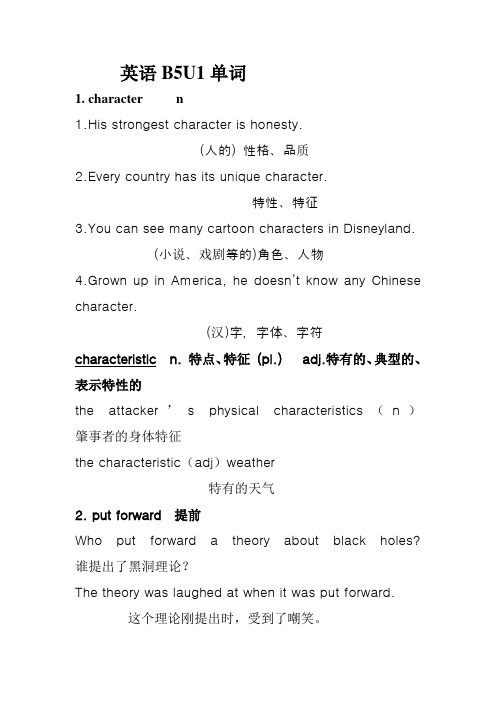
英语B5U1单词1. character n1.His strongest character is honesty.(人的) 性格、品质2.Every country has its unique character.特性、特征3.You can see many cartoon characters in Disneyland.(小说、戏剧等的)角色、人物4.Grown up in America, he doesn’t know any Chinese character.(汉)字,字体、字符characteristic n. 特点、特征(pl.)adj.特有的、典型的、表示特性的the attacker’s physical characteristics(n)肇事者的身体特征the characteristic(adj)weather特有的天气2. put forward 提前Who put forward a theory about black holes? 谁提出了黑洞理论?The theory was laughed at when it was put forward.这个理论刚提出时,受到了嘲笑。
We shall have to put the meeting forward.将...提前My watch was slow so I put it forward by ten minutes.将钟表拨快We put him forward for the position of chairman.推荐put up with忍受put away 收起来;存蓄;整理put off 推迟,延期put on 穿上,戴上;上演put out 使熄灭;生产;出版put through 接通电话;使经历;使通过put up 举起;修建;张贴put set/aside 搁置3. conclude v (无进行时)n. conclusionHe concluded from the their remarks that they were not in favor of the plan.推断出,得出结论Let me conclude my speech by thanking you again .(使)结束,终止4. analyse vt. 分析By analysing the parts of the sentence, we learn moreabout English grammar.通过分析句子的结构,我们学到更多关于英语语法的东西。
人教版必修第单元详尽单词讲解

V o c a b u l a r y o f U n i t 5 本单元单词多既可以做动词,又可以做名词。
●characteristic n[c].特征;特性&adj. 显着的;独特的近义词:feature搭配be characteristic of……表现。
的特点,是。
所特有的区别character性格,品质;性质;角色;特征(此时为不可数名词)e.g. T he two groups of children have quite different characteristics. 这两组儿童具有截然不同的特点She spoke with characteristic enthusiasm.她说话带着特有的热情The defiant manner is characteristic of teenagers. 那种反抗态度是十几岁的青少年所特有的。
●put forward提出搭配put oneself/sb. forward (as…) 自荐/提名某人(为某职位的候选人)put sth. forward 提前某事;把(时钟)往前拨;提出某事e.g. H e put forward a new plan. 他提出了一个新计划。
May I put your name forward as chairman of committee? 我可以提名你当委员会主席吗?put短语put aside 搁在一边(不去理会);储备put in 插话put down 放下;镇压;写下put away 收拾好;储存put off 延期put on 穿上;上演;假装put out 扑灭,使熄灭;生产put through 接通(电话);完成;实行put up 举起;搭建;张贴;留….住宿put up with 容忍put on weight 发胖;增加体重put back放回原处;拨回时钟;恢复正常●conclude v.结束;推断出搭配conclude (sth.) with….用……结束(某事)conclude……from 从……中推断出……同源conclusion n. 结论,决定;终结,结束arrive at/come to/reach/draw a conclusion 得出结论in conclusion 总而言之e.g. S he concluded her speech with a quotation from Shakespeare.她引用莎士比亚的名言结束了演讲What do you conclude from that? 从那你总结出了什么?I've come to the conclusion that he's not the right person for the job. 我得出结论,他不是那份工作的合适人选In conclusion, walking is a cheap, safe, enjoyable and readily available form of exercise.总而言之,散步是一种便宜、安全、愉快、方便的锻炼方式●defeat v.打扮;战败;使受挫;n. 失败辨析beat/defeat/winbeat/defeat 的宾语是人或某个集体。
character 主要用法

character主要用法1.表示人的“性格”或“品质”,或表示事物的“特性”或“特征”等,可用作可数或不可数名词。
如:They are twins but have quite different characters. 他们虽为双胞胎,但性格却相当不同。
He has a strong character. /He is a man of strong character.他有坚强的性格(他是个性格坚强的人)。
D21/zn2.表示小说或戏剧等中的“人物”或“角色”,是可数名词。
如:Who is the main character in the play? 这出戏中的主要人物是谁?His characters are well draw n. 他作品中的人物刻画得很好。
有时指“人”,根据语境有时有褒义(如指有个性的人等),有时有贬义(如指古怪或令人讨厌的人等)。
如:He is quite a ma n. 他真是个怪人(他这人真有个性)。
3.表示“文字”,指书写符号或印刷符号等,是可数名词。
如:He writes beautiful characters. 他能写一手漂亮的字character - n,用来描述人的性格,像是坚强、懦弱、乐观、积极;He is firm in character-他性格坚强。
characteristic- adj,用来描述人或事物的特征、特点,并非性格n. 特徵指标;标数;特色The ideal person for this job has these ______:ten years experience and an advanced degree.A,characters B,characteristics英语形容词作修饰语的位置在英语中,当名词有多个形容词修饰时,就有它们的先后顺序。
下面的口诀可帮你记住这一先后顺序,也是解题的关键。
限定描绘大长高,形状年龄和新老;颜色国籍跟材料,作用类别往后靠;其中,“限定词”包括:冠词、物主代词、指示代词、或数词,它位于各类形容词前。
character的词形变化

character的词形变化以下是为您生成的二十条关于“character”词形变化的内容:1. “Character”可以变成“characters”,就像一个人可以变成一群人一样!比如,“There is a character in the story.” (故事里有一个角色。
)而“There are many characters in the novel.” (小说里有很多角色。
)难道你不觉得这很有趣吗?2. “Character”还能变成“characteristic”,这就好像从一个人的整体变成了他独特的特点!像“He has a good character.” (他性格很好。
)再看“One of his characteristics is kindness.” (他的特点之一是善良。
)这难道不是很神奇?3. “Character”的过去式是“charactered”,不过这个用得比较少啦。
比如说“The story charactered her as a brave woman.” (这个故事把她描绘成一个勇敢的女人。
)你是不是很少见到这样用的?4. 还有“characterless”,就好像失去了灵魂一样!“This building is characterless.” (这座建筑毫无特色。
)跟“That old house has a lot of character.” (那座老房子很有特色。
)形成了鲜明对比,不是吗?5. “Characterize”也是从“character”变来的,就像是给一个人贴上标签!“His behavior characterizes him as a selfish person.” (他的行为表明他是个自私的人。
)这跟“We know her by her good character.” (我们通过她的好性格了解她。
)是不是很不一样?6. “Characterization”呢,就像是对一个人的全面描述!比如在“The author's characterization of the hero is vivid.” (作者对主人公的刻画很生动。
英语四级考试历年常考高频词汇:人及性格

英语四级考试历年常考高频词汇:人及性格character n. 性格、品性、特色、符号、汉字【例】cartoon characters 卡通人物【派】characteristic a.典型的 n.特征identity n. 身份、特性、同一性【例】the identity card身份证personality n. 个性、人格【例】a man of good personality 个性很好的人quality n. 质量、品质、优点、特点【例】products of quality 优质产品advantage n.优势、有利条件、利益、好处【考】take advantage of 占便宜gain an advantage over胜过, 优于virtue n. 美德、德行、长处、优点【派】virtuous a.有美德的【考】by virtue of 借助、借由decent a.得体的、体面的【例】a decent pay 一份不错的薪水【例】decent behavior 得体的行为generous a. 慷慨的,大方的, 宽宏大量的【派】generosity n. 慷慨delicate a.娇小的,纤细的,精美的, 易碎的【例】delicate skin 娇嫩的皮肤【派】delicacy n.精致、精致的食物slender a. 修长的、苗条的【例】a slender figure 苗条的身材fascinating a. 迷人的、有吸引力的【例】a fascinating young lady 年轻迷人的女士charm n. 魅力 vt. 迷住、吸引【派】charming a. 迷人的agreeable a.令人愉悦的、惬意的【例】agreeable weather 宜人的天气moderate a. 温和的、适度的【例】moderation 适度、中庸modest a. 谦虚的、适度的【例】 a modest price 适中的价格humble a. 卑微的、谦逊的【例】a humble beginning 卑微的出身genuine a. 真诚的、真的、非人造的【例】genuine leather 真皮ambition n. 抱负、野心【派】ambitious a.有抱负的、有野心的frank a. 坦白的、直率的【例】frankly speaking 坦白来说vigorous a. 有活力的、精力充沛的energetic a. 充满活力的、精力充沛的dynamic a. 有活力的、动力的、动态的 n.动力学upright a. 正直的、诚实的、垂直的decisive n. 坚定的、果断的、决定性的【例】a decisive factor 决定性因素elegant a. 优雅的【派】elegance n. 优雅、雅致sociable a. 友好的、好交际的thoughtful a. 体贴的、关心的、沉思的【例】She is thoughtful for her friends.她很体贴她的朋友们。
高中英语复习提升-修改后
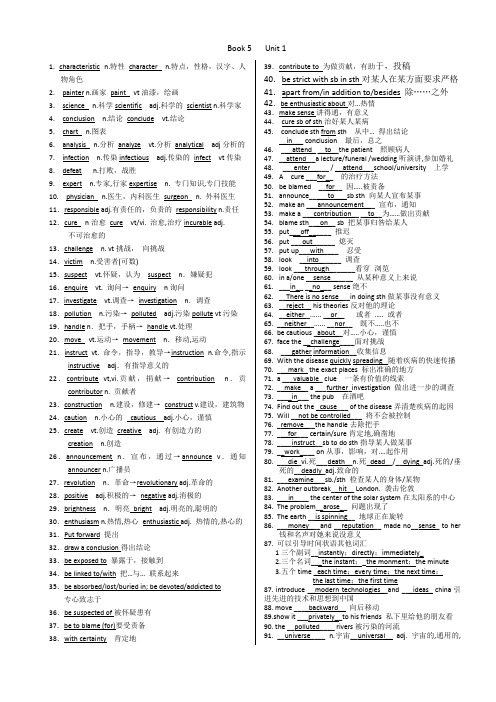
22.contributevt,vi.贡献,捐献→contributionn.贡contributorn.贡献者
23.constructionn.建设,修建→constructv.建设,建筑物
48.___enter_____ /__attend___school/university上学
49.Acure ___for__的治疗方法
50.be blamed __for__因…..被责备
51.announce_____to___sb sth向某人宣布某事
52.make an ___announcement___宣布,通知
73.____in___the pub在酒吧
74.Find out the_cause___ of the disease弄清楚疾病的起因
75.Will __not be controlled___将不会被控制
76._remove___the handle去除把手
77.___for___certain/sure肯定地,确凿地
33.be exposed to暴露于,接触到
34.be linked to/with把…与…联系起来
35.be absorbed/lost/buriedin; be devoted/addicted to
专心致志于
36.be suspected of被怀疑患有
37.be to blame (for)要受责备
28.positiveadj.积极的→negativeadj.消极的
29.brightnessn.明亮brightadj.明亮的,聪明的
character和characteristic有什么区别

character和characteristic有什么区别
Character和characteristic作名词时在表⽰“特性、特点、品质”上指向、可数或不可数、引申含义上有所不同。
Character多指⼀类⼈或事物所具有的独特的典型的特征;characteristic指某⼈或某物天⽣有别于他⼈或他物的内部特质或外表特征。
character和characteristic的区别
Character多⽤作可数名词,也可⽤作不可数名词。
characteristic是不可数名词。
Character是⽐较偏向于⾓⾊的意思,与其翻译成特点,到不如说是偏重于性格。
如果⽤在物件上,也是带有拟⼈化的意思。
⽽characteristic⼀般仅⽤来表⽰“特征”的意思,⽐如有某种性格的⼈,便会有某些特征、特点。
Character可作书写或印刷的“字体”“符号”解,“汉字”⼀般说Chinesecharacters。
characteristic⽆引申含义。
character和characteristic的例句
All the characters in this book are imaginary.
这本书中的⼈物都是虚构的。
What's your most special characters?
你个性上最⼤的特点是什么?
She has Asiatic characteristics.
她具有亚洲⼈的特点。
character的同义词

character的同义词character表字母;特性,特点性格,气质的意思,那么你知道character的同义词有哪些吗?接下来小编为大家整理了character的同义词,希望对你有帮助哦!character的同义词辨析1:alphabet, letter, character, script这些名词均有"字母"之意。
alphabet :指整个字母系统或一种语言的字母表,不表单个字母。
letter :指单个的字母。
character :通常指汉语的方块字,也指字符。
script :指书写或印刷的字母。
character的同义词辨析2:quality, property, feature, characteristic, peculiarity, trait, attribute, character这些名词均有"特性,特点,品质"之意。
quality :最普通用词,既可指有形或无形的特性,又可指个性或共性的特征。
property :多指同类事物所共有的特性,一般不用于指人。
feature :指事物突出引人注目的特点。
多用来说明人的容貌特征或地理特征。
characteristic :指某人或某物天生有别于他人或他物的内部特质或外表特征。
peculiarity :指人或事物独具的或奇怪的特点,常带感情色彩。
trait :多指人的性格、心情的特征,尤指先天秉赋的持久的行为模式或性格特征。
attribute :通常指人主观赋予某事物的属性,可指典型事物。
character :多指一类人或事物所具有的独特的典型的特征。
character的同义词辨析3:temper, character, nature, personality, disposition,complexion这些名词均有"性格,气质,性情,习性"之意。
temper :指从感情方面体现出来,决定处理问题或应付形势的方式的性格或性情,这种性情可以是暂时的也可以长久的。
性格特征英文怎么写

性格特征英文怎么写性格特征英文怎么写在英语学习中,英语词汇学习是一门重要的必修课,下面是店铺帮大家整理的性格特征英文怎么写,供大家参考借鉴,希望可以帮助到有需要的朋友。
性格特征的英文character trait参考例句:Phrenology: Study of the shape of the skull as an indication of mental abilities and character traits.颅相学:指分析头颅的轮廓以测定他的智力和性格特征。
the impress of one's personality一个人的性格特征We should first know the impress of one's personality.我们要首先掌握一个人的性格特征。
The figures all have different in age, character and identity.这些人物的年龄、身份、性格特征各不相同。
A graphic representation or chart of the personality traits of an individual or a group.心理记录表一种个人或群体的性格特征的图示或图表character是什么意思:n. 品质,性格,特征,特点,角色,名誉,有趣的人,字符,字体,身份v. 使具有特性,刻,印A coded character set whose character set is an alphabetic character set一种编码字符集,它的字符集是一种字母字符集。
Fluctuations are spatial and temporal in character.这种波动的特点是空间性和瞬时性的。
To lower in quality orcharacter;debase.使变得低劣降低质量或品格;贬低Characters drift about aimlessly.人物总是漫无目的地四处漂泊。
性格特征英文怎么写
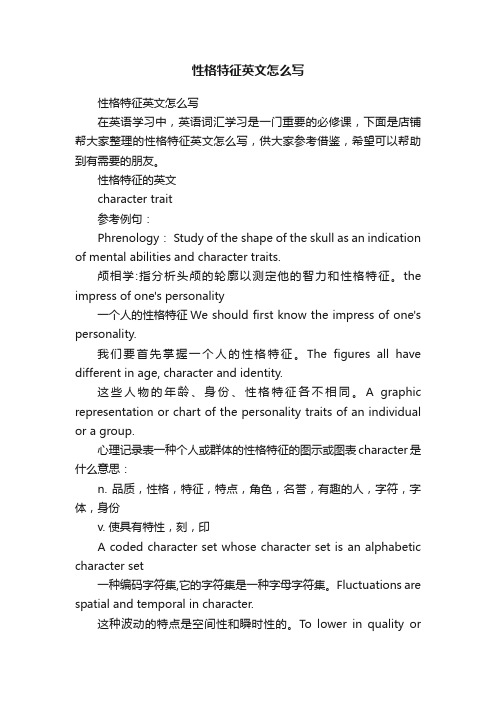
性格特征英文怎么写性格特征英文怎么写在英语学习中,英语词汇学习是一门重要的必修课,下面是店铺帮大家整理的性格特征英文怎么写,供大家参考借鉴,希望可以帮助到有需要的朋友。
性格特征的英文character trait参考例句:Phrenology: Study of the shape of the skull as an indication of mental abilities and character traits.颅相学:指分析头颅的轮廓以测定他的智力和性格特征。
the impress of one's personality一个人的性格特征We should first know the impress of one's personality.我们要首先掌握一个人的性格特征。
The figures all have different in age, character and identity.这些人物的年龄、身份、性格特征各不相同。
A graphic representation or chart of the personality traits of an individual or a group.心理记录表一种个人或群体的性格特征的图示或图表character是什么意思:n. 品质,性格,特征,特点,角色,名誉,有趣的人,字符,字体,身份v. 使具有特性,刻,印A coded character set whose character set is an alphabetic character set一种编码字符集,它的字符集是一种字母字符集。
Fluctuations are spatial and temporal in character.这种波动的特点是空间性和瞬时性的。
To lower in quality orcharacter;debase.使变得低劣降低质量或品格;贬低Characters drift about aimlessly.人物总是漫无目的地四处漂泊。
高中英语必修五单词词型转换(人教版)

Book 5Unit 1characteristic n.特征;特性adj.特有的;独特的;表示特性的;显示…的特征的→character n.性格,特征;品行;字母,符号;人物paint n.颜料,涂料; v t. 绘画→painter n. 画家;油漆匠→painting n.绘画;油画put forward 提出science n.科学;理科→scientific adj.科学的→scientifically adv.科学地conclude vt. & vi.结束;推断出→conclusion n.结论;结束→conclusive adj.决定性的draw a conclusion得出结论analyse vt.分析→analysis n.分析,分解△infect vt.传染;感染→infection n. <医>传染,感染→infected adj.(伤口)被感染的→infective adj.会传染的;有传染性的△infectious adj.传染的△cholera n. 霍乱defeat vt. 打败;战胜;使受挫n. 失败expert adj.熟练的;经验或知识丰富的n. 专家;行家attend vt. 照顾;护理;出席;参加→attendance n. 出席,参加→attendant adj. 出席的physician n.医生;内科医师→physical adj. 自然(界)的;身体的;物质的expose vt. 暴露;揭露;使曝光→exposure n.暴露;揭发→exposition n.博览会;展览会→exposed adj. 裸露的,暴露的expose … to使显露;暴露△deadly adj. 致命的→deadliness n. 致命cure n. 治愈;痊愈vt.治愈;治疗→curable adj. 可治愈的△outbreak n.爆发;发作(尤指疾病或战争)→v. break outchallenge n.挑战vt. 向……挑战→challenger n.挑战者victim n.受害者absorb vt. 吸收;吸引;使专心→absorbed adj.被…吸引住,专心致志suspect vt. 怀疑n. 被怀疑者;嫌疑犯→suspectable adj.可疑的enquiry n.询问→enquire vi.打听;询问neighborhood n.附近;邻近→neighbor n.邻居severe adj. 严重的;剧烈的;严厉的→severe ly adv.严格地;严重地△clue n.线索;提示pump n. 泵;抽水机vt.(用泵)抽水△Cambridge Street 剑桥大街foresee vt.预见;预知→foresee able adj. 可预见到的→foretell; forecast△investigate vt. & vi.调查△investigation n.调查→investigator n. 调查者;研究者blame vt.责备;谴责n.过失;责备pollute vt. 污染;弄脏→pollution n. 污染polluter n.污染者;污染物质handle n.柄;把手vt. 处理;操纵△germ n.微生物;细菌link vt. & n.连接;联系link … to 将……和……联系或连接起来announce vt. 宣布;通告→announcement n.通告△certainty n.确信;确实→certain adj.某一;必然的→ certainly adv.无疑;当然instruct vt.命令;指示;教导→instruction n.授课;教诲→instructive adj. 有益的;教育性的△responsible adj.有责任的;负责的→responsibility n.责任→responsibly adv. 负责地construct vt. 建设;修建→constructive adj.建设的,建设性的construction n.建设;建筑物contribute vt. & vi.捐献;贡献;捐助→contribution n.贡献,捐赠apart from 除……之外;此外firework n.烟火(燃放)chart n. 图表△creative adj. 有创造力的;创造性的;独创的→creation n. 制造,创造;创造物,产物→creativity n. 创造性,创造力△co-operative adj. 合作的→co-operation n. 合作positive adj.积极的;肯定的;确实的→positively adv.明确地;肯定地→ positivism n.自信(be) strict with… 对……严格的△Nicolaus Copernicus尼古拉·哥白尼(波兰天文学家)△revolutionary adj. 革命的;重大变革的→revolution n. 革命movement n. 移动;运动;动作make sense 讲得通;有意义backward adv. & adj.向后地(的);退步地(的)→forward adv. & adj.向前地(的)△loop n. 圈;环△privately adv. 私下地,秘密地→private adj. 私有的→privacy n.隐私,秘密spin vi. & vt.(使)旋转;纺(线或纱)△brightness n. 明亮;亮度;聪颖→bright adj. 明亮的,鲜亮的;聪明的Enthusiastic adj. 热情的;热心的→enthusiasm n.热情cautious adj. 小心的;谨慎的→caution n. 小心;警告→cautiously adv.小心地,谨慎地reject vt. 拒绝;不接受;抛弃→rejection n. 拒绝→rejective adj.拒绝的,排斥的universe n. 宇宙;世界→universal adj. 普遍的,一般的;通用的Unit 2unite vi. & vt. 联合;团结→unit n.单位,单元kingdom n.王国consist vi.组成;在于;一致→consistent adj. 一致的,连续的→consistently adv.一贯地consist of 由……组成△London Heathrow Airport 伦敦希思罗机场province n.省;行政区△River Avon 埃文河△River Thames泰晤士河△River Severn塞文河divide … into 把……分成△Wales 威尔士(英)△Scotland 苏格兰(英)△Northern 北爱尔兰(英)clarify vt. 澄清;阐明→clarification n.澄清、说明→clarity n. 清楚,明晰accomplish vt. 完成;达到;实现→accomplishment n.成就;完成conflict n.矛盾;冲突unwilling adj. 不愿意的;不乐意的→willing adj. 乐意的,愿意的→will n. 愿意;意志break away (from)挣脱(束缚);脱离union n.联合;联盟;结合;协会△the Union Jack 英国国旗credit n. 信任;学分;赞扬;信贷→credible adj.可信的,可靠的to one’s credit 为……带来荣誉;值得赞扬;在……名下currency n. 货币;通货→current adj. 现在的;最近的;流行的institution n.制度;机制;公共机构→institute n. 协会;学会;学院△educational adj.教育的→education n. 教育→educate v. 教育convenience n. 便利;方便→convenient adj. 方便的→conveniently adv. 方便地,便利地rough adj. 粗糙的;粗暴的roughly adv. 粗略地;粗糙地△Midlands 英格兰中部地区(英)nationwide adj. 全国性的;全国范围的→nation n. 国家;民族→worldwide adj.全世界的attract vt. 吸引;引起注意→attraction n.吸引→attractive adj. 有魅力的→attractively adv. 动人地△historical adj. 历史(上)的;有关历史的→historic adj.有历史影响的→history n. 历史architecture n. 建筑学;建筑艺术→architect n. 建筑师,设计师△Roman n.(古)罗马人adj.(古)罗马的collection n. 收藏品;珍藏;收集→collect vt. 收集administration n. 管理;行政部门→administrator n. 管理者port n. 港口(城市)→import vt. 输入,进口export vt.& vi. 出口,输出△Anglo-Saxon n. 盎格鲁–撒克逊人adj.盎格鲁–撒克逊人的△Norman n. 诺曼人;诺曼语adj. 诺曼的;诺曼人(语)的△Viking n. 北欧海盗;斯堪的纳维亚人countryside n. 乡下;农村enjoyable adj. 令人愉快的;使人高兴的leave out 省去;遗漏;不考虑△opportunity n. 机会;时机description n.描写;描述→describe vt. 描写,形容furnished adj. 配备好装备的;带家具的→furnish vt. 陈设,布置→furniture n. 家具;设备fax n. 传真(机)vt. 用传真传输(文件)possibility n. 可能(性)→possible adj. 可能的→impossible adj. 不可能的plus prep. 加上;和adj. 加的;正的;零上的→minus prep. (表示运算)减去quarrel n. 争吵;争论;吵架vi. 争吵;吵架alike adj. 相同的;类似的→likewise adv. 同样地likely adj. 可能的; adv. 可能take the place of 代替break down(机器)损坏;破坏arrange vt. 筹备;安排;整理→arrangement n. 安排wedding n. 婚礼fold vt. 折叠;对折→unfold vt.& vi. 展开,打开sightseeing n. 观光;游览delight n. 快乐;高兴;喜悦vt. 使高兴;使欣喜→delighted adj. 高兴的royal adj. 王室的;皇家的;高贵的→loyal adj. 忠诚的uniform n. 制服△St Paul’s Cathedral 圣保罗大教堂splendid adj. 壮丽的;辉煌的;极好的△Westminster 威斯敏斯特教堂statue n.塑像;雕像△Buckingham Palace 白金汉宫△Greenwich n. 格林尼治(英城市)△longitude n. 经线;经度→latitude n. 纬度altitude n. 海拔attitude n. 态度△imaginary adj.假想的;虚构的→imaginative adj. 富于想像力的imaginable →adj.可想像的;可能的△navigation n.导航;航行→ navigate vi.驾驶;航行△Highgate 海格特墓communism n. 共产主义→ communist n.共产主义者△original adj. 最初的;原始的;独创的;新颖的→origin n. 起源,根源thrill vt. 使激动;使担战心惊→thrilling adj. 令人兴奋的;毛骨悚然的pot n. 罐,壶error n. 错误;过失;廖误tense n.时态consistent adj. 一致的Unit 3aspect n.方面;层面impression n. 印象;感想;印记→impress vt.印;给…以深刻印象→impressive adj.给人印象深刻的,感人的→impressed adj.印象深刻的take up 拿起;接受;开始;继续constant adj.时常发生的;连续不断的constantly adv. 不断地→consi stently adv.一贯地,坚持地jet n.喷气式飞机vt.喷射,喷出△jet lag 飞行时差反应△flashback n.闪回;倒叙previous adj.在前的;早先的→previously adv.事先;以前uncertain adj.不确切的;无把握的→uncertainly adv.犹豫不决地,没把握地guide n. 指导;向导;导游vt. 指引;指导→guideline n.指导方针;指导原则tablet n.药片△expertise n.专家意见;专门知识(技能等)→expert n.专家,能手capsule n.太空舱;胶囊steward n.乘务员;服务员stewardess n. 女乘务员opening n.(出入的)通路;开口;开端sideways adv.往(向、从)一侧;侧着;侧面朝前surrounding n.周围的事物;环境adj. 周围的→surround vt.包围,围绕tolerate vt. 容忍;忍受→toleration n.容忍;默认△combination n.结合;组合→combinative adj.结合的,可组合的→combine v.使结合;使化合lack vi. & vt.缺乏;没有n. 缺乏;短缺的东西→ lacking adj.缺乏的adjustment n. 调整;调节→adjust vt.& vi.适应,调整,校正→adjustable adj.可调整的,可调节的mask n. 面具;面罩;伪装be back on one’s feet(困境后)恢复;完全复原△hover vi.盘旋carriage n. 运输工具;四轮马车;客车press vi. & vt.按;压;逼迫n. 按;压;印刷;新闻→pressure n.压(力);压力fasten vt. 系牢;扎牢→fast adj. & adv.快的;紧的belt n. 腰带;皮带safety belt 安全带lose sight of ….看不见……sweep up 打扫;横扫flash vt. & vi. (使)闪光;(使)闪现switch n.开关;转换vt. 转换timetable n. 时间表;时刻表△exhausted adj. 筋疲力尽的;疲惫不堪的→exhaust vt.用尽,耗尽→exhausting adj.使人精疲力竭的slide into (快捷而悄声地)移动;溜进……optimistic adj.乐观(主义)的→optimist n.乐观主义者→optimism n.乐观;乐观主义△pessimistic adj. 悲观(主义)的→pessimist n.悲观主义者→pessimism n.悲观;悲观主义speed up 加速△pedal n. 踏板;脚蹬△alien n. 外星人;外国人adj. 陌生的;外国的;外星球的mud n. 泥(浆)→muddy adj.泥泞的;暗的desert n.沙漠;荒原v.丢开,抛弃△enormous adj. 巨大的;庞大的→enormously adv.巨大地,庞大地△imitate vt. 模仿;仿造→imitative adj.& adv.模仿地,仿效地△moveable adj.可移动的;活动的citizen n. 公民;居民;市民→city n.城市;typist n. 打字员→type n.类型;铅字typewriter n. 打字机postage n. 邮资→postal adj.邮政的→post n.邮件;邮政vt.张贴postcode n.邮政编码button n. 钮扣;按钮instant n. 瞬间;片刻adj. 立即的;立刻的→instantly adv.立即,马上receiver n. 接受者;接收器;电话听筒→receive vt.& vi.收到△efficiency n. 效率;功效→effect n.影响;效果△efficient adj. 效率高的;有能力的→effective adj.起作用的△ribbon n. 丝带;带状物dustbin n. 垃圾箱→dust n.灰尘bin n.箱子,容器△dispose vt. 布置;安排→disposable adj.一次性的,可任意处理的△disposal n. 清除;处理ecology n. 生态;生态学→ecological adj.生态(学)的→ecologist n.生态学者greedy adj.贪吃的;贪婪的;贪心的swallow vt. 吞下;咽下material n.原料;材料→materialize vi.具体化recycle vt. 回收利用;再利用→recyclable adj.可循环再用的△manufacture vt.(用机器)大量生产;成批制造→manual adj.手的facture n.制作,制作法goods n. 货物△etc 诸如此类,等等representative n. 代表;典型人物adj. 典型的;有代表性的→represent vt.表现,象征;代表→representation n.表现;陈述settlement n. 定居;解决→settle vt.解决;安排motivation n. 动机→motivate vt.使有动机,促动Unit 4journalist n. 记者;新闻工作者→ journal n.日报,日志△involve vt. 牵涉;涉及;包括;使参与(卷入)→involvement n.牵连,参与editor n.编辑→ edition n.版次,版本→ edit vt. 编辑;主编photograph n. 照片vt.给……照相photographer n. 摄影师△photography n.摄影△unforgettable adj. 难忘的;永远记得的→ forgettable adj.容易被忘的,可忘记的→forgetful adj.健忘的;好忘事的△assignment n. 任务;分配→ assign vt. 选派,分配delighted adj.快乐的;欣喜的admirable adj. 值得赞扬的;令人钦佩的→admire vt.赞赏;称赞→admiration n.钦佩,赞美unusual adj.不同寻常的;独特的→ usual adj.通常的,常有的,常见的→ usually adv.通常,经常assist vt.帮助;协助;援助assistant n. 助手;助理;售货员submit vt. 递交;呈递(文件等)profession n. 职业;专业→ professor n.教授professional adj. 专业的;职业的n. 专业人员colleague n. 同事→ college n.大学eager adj. 渴望的;热切的concentrate vt. 集中;聚集→ concentration n.集中;专心→ concentrated adj.集中的;全神贯注的concentrate on 集;全神贯注于amateur n. 业余爱好者update vt. 更新;使现代化→ updated adj.最新的;现代化的acquire vt. 获得;取得;学到→ acquirement n.取得,习得→ require vt.要求;需要enquire vi.打听;询问assess vt. 评估;评定→ assessment n.评估;评价;inform vt. 告知;通知→ information n.信息,数据→ informer n.告密者;通知者deadline n. 最后期限△interviewee n.参加面试者;接受采访者→ interviewer n.面试者;采访者meanwhile adv.其间;同时→ meantime n.其时,其间adv.同时,其间depend on 依靠;依赖case n. 情况;病例;案例accuse vt. 指责;谴责;控告accuse … of 因……指责或控告……△accusation n.指责;谴责;控告deliberately adv. 故意地→ deliberate adj.故意的→ deliberation n.考虑so as to (do sth) 为了(做)……△deny vt. 否认;拒绝skeptical adj. 怀疑的→ skeptically adv.怀疑地guilty adj. 犯罪的;有罪的;内疚的dilemma n.(进退两难的)困境;窘境demand n. 需求;要求vt.强烈要求△demanding adj. 要求很高的;费力的publish vt. 出版;发行;发表;公布→ publisher n. 出版社△scoop n. 抢先获得的新闻、利润等;勺子;铲子section n. 部分;节→ sectional adj. 局部的△concise adj. 简明的;简练的△imaginative adj. 富于想象力的→ imagine vt.想,设想→ imagination n.想像,想像力technical adj.技术(上)的;技巧方面的→ technique n.技巧;技能technically adv.技术上;工艺上thorough adj. 彻底的;详尽的→ thoroughly adv.彻底地gifted adj. 有天赋的→ gift n.赠品;天赋△idiomatic adj.惯用的;合乎语言习惯的→ idiomatically adv.符合语言习惯地housewife n. 家庭主妇→ housework n.家务劳动crime n. 罪行;犯罪edition n.版(本);版次ahead of 在……前面department n.部门;部;处;系→ depart v.离开;离职accurate adj. 精确的;正确的→ accurately adv.正确无误地,准确地→ accuracy n.精确(性)senior adj. 年长的;高年级的;高级的→ junior adj.较年幼的;低年级的polish vt.擦亮;磨光;润色chief adj. 主要的;首席的n. 首领;长官→ chiefly adv.首先,第一;主要approve vt. 赞成;认可;批准→ approver n.承认者,赞同者→ approved adj.经核准的,被认可的process vt.加工;处理n. 过程;程序;步骤△negative n. 底片;否定adj. 否定的;消极的→ positive adj.积极的;肯定的appointment n.约会;任命→ appoint vt.任命;约定Unit 5aid n. & vt.帮助;援助;资助first aid(对伤患者的)急救temporary adj.暂时的;临时的→ permanent adj.永久(性)的,永恒的fall ill 生病injury n. 损伤;伤害→ injure vt.损害,毁坏bleed vi. & vt. 流血→ blood n.血,血液△nosebleed n. 鼻出血;流鼻血△sprain vt. 扭伤△sprained adj. 扭伤的ankle n.踝(关节)choke vi. & vt. (使)噎住;(使)窒息→ choked v.填塞cupboard n.橱柜;衣柜skin n. 皮;皮肤→ skinny adj.极瘦的,皮包骨的△essential adj.最重要的;不可缺少的;本质的→ essentially adv.本质上,根本上organ n.器官→ organization n.组织;机构;△layer n.层;层次barrier n.屏障;障碍(物)poison n.毒药;毒害vt. 毒害;使中毒→ poisonous adj.有毒的ray n.光线;射线complex adj.复杂的variety n.变化;多样(化);多变(性)→vary vi.变化→ various adj.各种各样的;许多的→variable adj.变化的,可变的liquid n.液体→ solid n.固体gas n.气体radiation n. 辐射;射线→ radio n.无线电;收音机mild adj. 轻微的;温和的;温柔的mildly adv. 轻微地;温和地pan n. 平底锅;盘子stove n.炉子;火炉△heal vi. & vt.(使)康复;(使)化解→health n.健康状况→healthy adj.健康的tissue n.(生物)组织;薄的织物;手巾纸electric shock 触电;电休克swell vi. & vt.(使)膨胀;隆起→ swelling n.肿胀swollen adj. 肿胀的△blister n. 水泡vi. & vt.(使)起泡△watery adj.(似)水的△char vi.烧焦△nerve n.神经;胆量→ nervous adj.焦虑的;紧张不安的scissors n.剪刀unbearable adj. 难以忍受的;不能容忍的→ bear n.熊vt.忍受basin n.盆;盆地→ basic adj.基本的squeeze vt. & vi. 榨;挤;压榨squeeze out 榨出;挤出over and over again 反复;多次bandage n.绷带in place 在适当的位置;适当△ointment n.药膏;油膏△infection n. 传染;传染病;感染→ infect vt.使受影响,感染→ infectious adj.传染的vital adj.至关重要的;生死攸关的→vitality n.活力symptom n.症状;征兆△label vt. 加标签或标记;分类n.标签;标记kettle n.(水)壶;罐pour vt. & vi. 倒;灌;注;涌wrist n.手腕damp adj. 潮湿的△Casey 凯西(姓)sleeve n.袖子blouse n.女衬衫tight adj.牢的;紧的;紧密的tightly adv.紧地;牢牢地firm adj. (动作)稳定有力的;坚定的firmly adv. 坚固地;稳定地throat n.咽喉;喉咙△Janson 詹森(姓)ceremony n.典礼;仪式;礼节bravery n.勇敢;勇气→brave adj.勇敢的△Slade 斯莱德(姓)△stab vt. & vi. 刺;戳;刺伤a number of 若干;许多→the number of …的数目put one’s hands on 找到treat vt. & vi.治疗;对待;款待n.款待;招待→ treatment n.治疗;待遇apply vt.涂;敷;应用vi. 申请;请求;使用;有效→ application n.应用,运用;申请pressure n.压力;挤压;压迫(感)ambulance n.救护车△scheme n.方案;计划△Southerton 萨瑟顿(姓)make a difference区别对待;有影响;起(重要)作用△bruise n. & vi. 瘀伤;擦伤。
- 1、下载文档前请自行甄别文档内容的完整性,平台不提供额外的编辑、内容补充、找答案等附加服务。
- 2、"仅部分预览"的文档,不可在线预览部分如存在完整性等问题,可反馈申请退款(可完整预览的文档不适用该条件!)。
- 3、如文档侵犯您的权益,请联系客服反馈,我们会尽快为您处理(人工客服工作时间:9:00-18:30)。
character, characteristic, trait, personality,
feature, attribute, property
一、character n. 性格,品质,人物,角色;[计]字符;指个人、社会、民
族等的“特性,性格”,或指人的独特的典型的特征或性格。
通常是自身素质的体现,强调后天培养的结果。
例如:
(1)All the characters in this book are imaginary. 这本书中的人物都是虚构的。
(2)Dr. Watson is a character in the Sherlock Holmes stories.
华生医生是福尔摩斯探案故事中的一个人物。
(3)What's your most special characters? 你个性上最大的特点是什么?
(4)That man has a firm character now, but in his youth, his charater was weak.
那个人现在性格坚强,但是在少年时代,他性格软弱。
(5)Indeed, he is a very kind man at heart. What you know about him is not his real character.
确实他是一个非常心地善良的人。
你对他的了解并不是他的真正品格。
(6)A man’s character can be measured by the types of men with whom he associates. 一个人的性格可从他交往何种类型的人加以判断。
(7)He seems to be a man of good character. 看来他是一个品格优良的人。
(8)I'd like to use small characters of this essay. 这个作文我想用小号字符。
二、characteristic 指“特征,特点,规格参数表”,指某人或某物恒定
的、先天有别于他人或他物的内部或外部属性和特征,并非性格。
可指人或事物所具有的、不同于其他人或物的个性或性质。
指人时是character(性格)中的具体特征或特点。
例如:
(1)What characteristics distinguish the Chinese from the Japanese?
中国人不同与日本人的特征是什么?
(2)She united with herself the characteristics of two distinct persons.
她身上具有两个截然不同的人的特点。
(3)She has Asiatic characteristics. 她具有亚洲人的特点。
(4)Reaction to strong stimuli from the outside world is a characteristic of all animals. 对外界的刺激产生反应是所有动物的一个特性。
(5)This town has all the characteristics of a typical seaside resort.
这个小城镇具有所有典型的的海滨特色。
(6)a characteristic of Western/Chinese civilization
(7)women''s physiological characteristics
(8)The nationalities in China have all retained their special national characteristics.
三、trait与character一样,指人的具体性格的特征, 侧重于指先天行为模式或性格特征。
(1)Enthusiasm and honesty are the chief traits / characteristics of his character. 热情和诚实是他的性格的两个主要特征。
(2)The world discriminates one on the basis of clearly genetic traits, such as physical beauty and musical talent.
世界常根据显著遗传特点区分人,如长相美和音乐天赋等。
四、personality意思是“性格,个性”,多指的是人的个性,是先天与后
天的综合,常表现在与人相处的关系中。
例如:
(1)My father is a man with a strong personality. 我父亲是个个性很强的人。
(2)He has a pleasing personality, which makes him popular.
他有讨人喜欢的个性,这使他很受欢迎。
五、feature“特征,特色”,用于人指人的外貌特征,用于物指因其外形或重要性突出而引人注目的特点,不表示属性或特质:
1. 相貌[容貌] 的一部分(指眼、鼻、口、耳、额、颚等的任一部分);
a man of fine features 美貌的男子,美男子
(1)I haven’t seen him for ages, but I can recall his features very distinctly.
我好久没有见到他了,但我还能清楚地回忆起他的容貌。
(2)Her dancing eyes are her most attractive features.
2. 显著的特征,特色;要点[of]
the geographical features of a district 某地区的地理特征
(3)The magazine makes a feature of children's stories.
这本杂志以刊登儿童故事为特色。
(4)The most fruitful approach to a problem is the one which reveals the fundamental features of the problem.
解决问题最富有成效的方法是一个能揭示该问题基本特征的方法。
An important feature of our work is students'' involvement.
The most outstanding national feature is the language.
(5)The mountains are certainly the most important feature of this area's landscape. 这群山脉显然是这一地区地貌的最大特色。
3. 电影、舞台表演等的精彩部分,号召物(第二个意思的引申)
(6)The main feature on the program is her song.
那个节目的主要号召物[节目中最吸引人的部分/特色]是她的歌。
六、attribute多指主观人赋予某人或某事物特性或属性。
(1)A certain degree of ruthlessness is a necessary attribute for any successful CEO or president. 某种程度的残酷对任何一个成功的首席执行官或董事长来说是一种必需要具备的特性。
(2)Credibility is an essentail attribute that is build on the elements of integrity, reliability, competence and commitment.
诚信是人的一个基本的特质,是建立在正直、可靠、能力和承诺的基础上。
(3)Heavy rain is a distinctive attribute of the weather near the equator.
下大雨是赤道附近地区气候的显著的特征。
七、property 多指物的物理或化学特性,或同类事物所共有的特性,一般
不用于指人。
(1)The two elementary forms of carbon have very different properties.
碳的这两个基本形式的性质大不相同。
(2)We may not be able to identify a substance from a single property.
凭单一性质我们也许不能别出一种物质。
